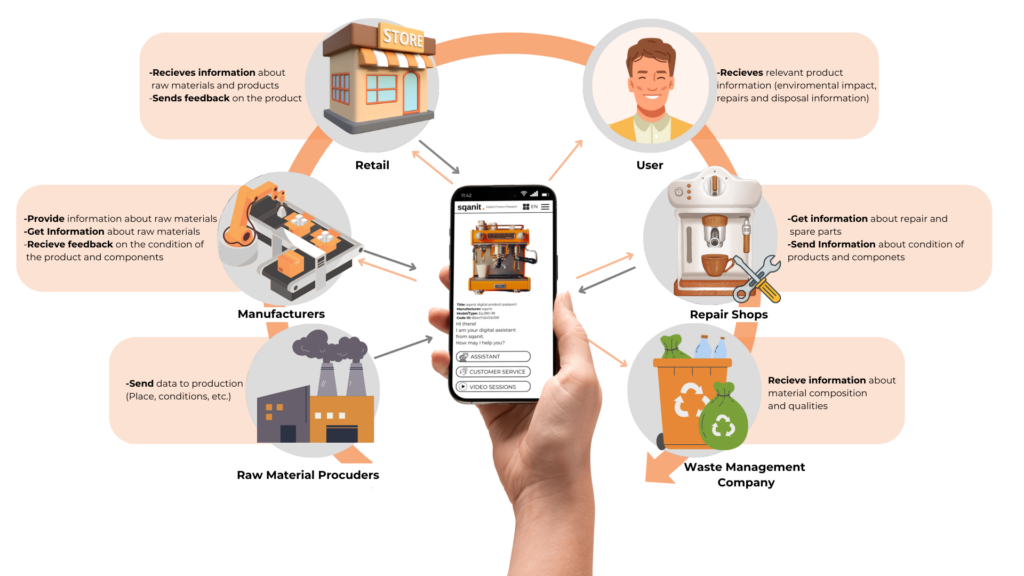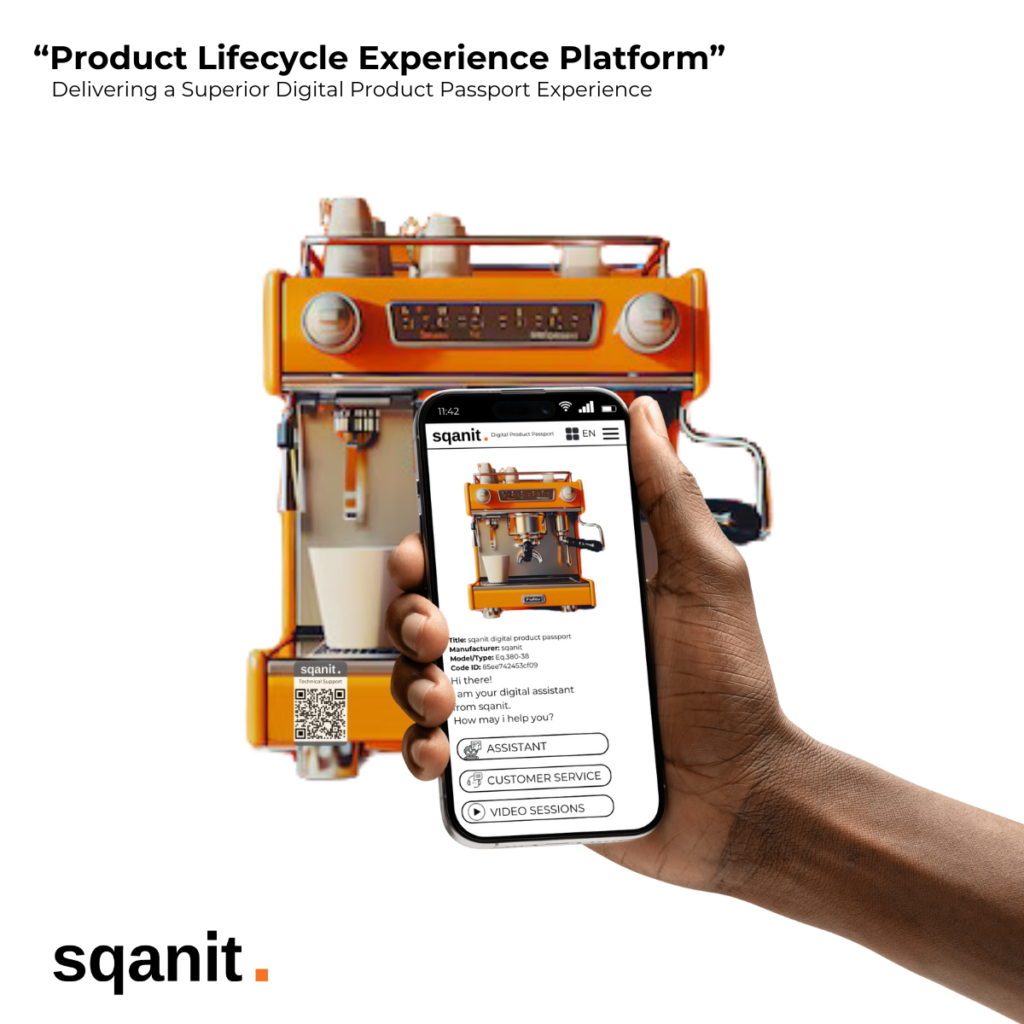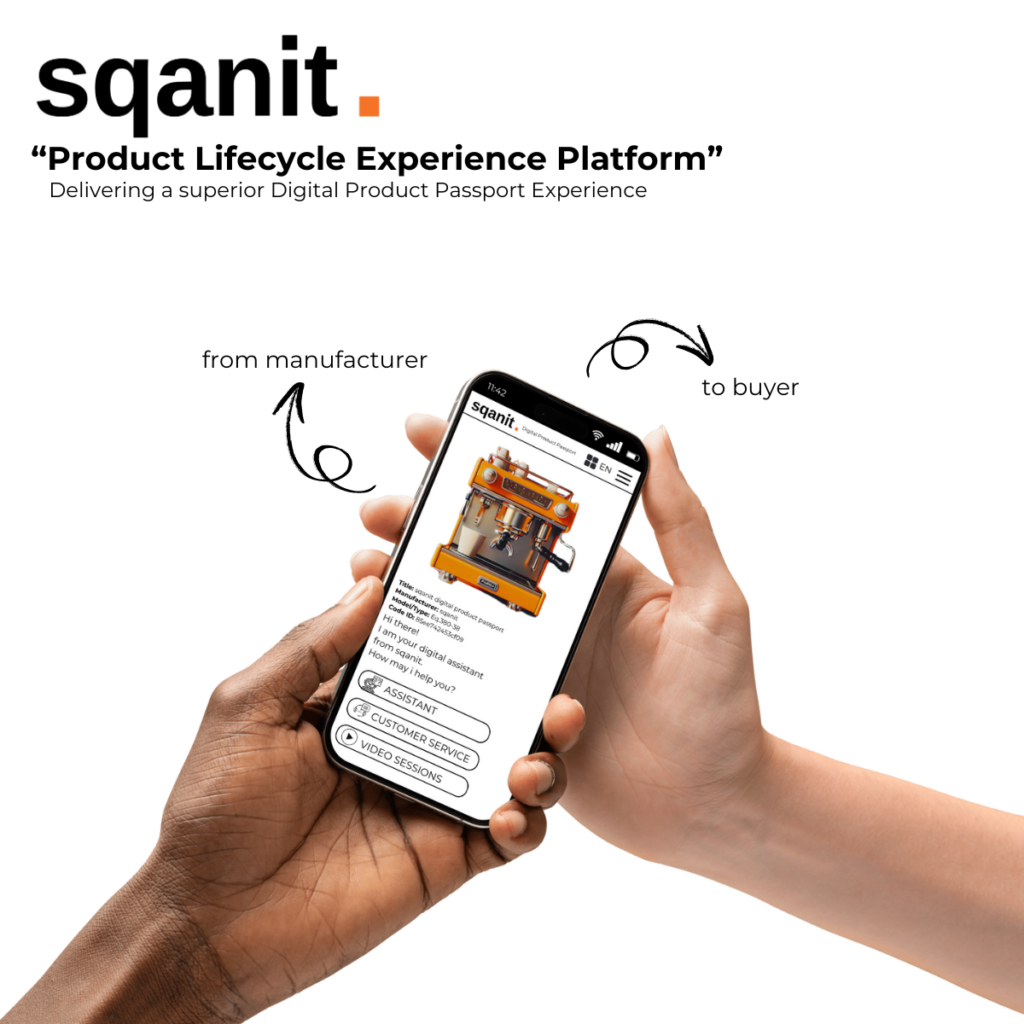Introduction
Digital Product Passports (DPPs) are innovative tools designed to enhance sustainability by providing transparent information about a product’s environmental impact, recyclability, and overall lifecycle. By collecting and sharing detailed product data, DPPs track everything from raw material sourcing to manufacturing processes. This facilitates seamless communication between various stakeholders, allowing the creation of value and benefits within the ecosystem.
As the importance of sustainable consumption grows, DPPs are becoming increasingly vital. They empower consumers to make informed decisions while enabling businesses to showcase their commitment to environmental responsibility. In this article, we will explore the definition, functionality, legal context, practical applications, and numerous advantages of Digital Product Passports in detail.
What is a Digital Product Passport?
A Digital Product Passport (DPP) is an innovative system designed to enhance sustainability by offering comprehensive data throughout a product’s lifecycle. These passports act as digital identities for products, encapsulating essential information such as environmental impact and recyclability.
DPPs provide in-depth insights by detailing key elements, including the product’s origin, production methods, and care instructions. They leverage technologies like QR codes, enabling users to easily access a wealth of information simply by scanning the code. This functionality allows consumers to swiftly obtain details about the materials’ origins, environmental effects, and recycling guidelines.
The adoption of Digital Product Passports is rapidly gaining traction in various sectors, particularly in electronics and fashion, where transparency and sustainability are increasingly prioritized.

sqanit’s Digital Product Passport Solution
sqanit, a Munich-based technology innovator, provides an exceptional Digital Product Passport (DPP) experience through its advanced Product Lifecycle Experience (PLX) Platform.
This platform enables companies to optimize the total lifecycle value of their products while enhancing service and after-sales experiences associated with their physical products.
By doing so, sqanit supports businesses in achieving their sustainability objectives while ensuring compliance with the Ecodesign for Sustainable Products Regulation (ESPR) and the EU Circular Economy Action Plan.

If you would like to learn more about Digital Product Passports and explore the opportunities this innovative solution offers, please fill out this form, and we will get in touch with you.
Beyond the Digital Product Passport, sqanit offers a range of features designed to enrich the user experience and meet evolving customer needs.
Key offerings include:
- AI-Powered Self-Service Options: Allow users to quickly find answers to their queries.
- File Management: Facilitates the organization and storage of user manuals and other essential documents.
- Service Communication: Features chat and ticketing systems that provide users with instant support.
- Augmented Reality (AR) Supported Remote Assistance: Offers visual guidance to help users navigate and resolve complex issues.
Moreover, users can report problems by creating tickets with sqanit and receive direct assistance through video calls. These functionalities enhance customer satisfaction by ensuring a seamless experience and improving service quality for companies.
Digital Product Passports are crucial for promoting sustainability and transparency. With the solutions provided by sqanit, businesses can effectively manage product information while delivering an outstanding customer experience. This approach aims to foster more conscious consumption habits, contributing to a sustainable future.
Upcoming Requirement: EU ESPR
The Ecodesign for Sustainable Products Regulation (ESPR), established under the EU’s Circular Economy Action Plan and the European Green Deal, is set to introduce comprehensive performance and disclosure standards for products sold in the EU market. This regulation expands beyond energy-related products, encompassing a wide range of sectors, including textiles, and specifies detailed performance and information criteria.
Importantly, the ESPR outlines specific requirements for Digital Product Passports (DPPs). These requirements focus on essential elements such as the machine readability of data and the adoption of open standards, ensuring that DPPs are accessible and interoperable across various platforms.
sqanit’s Digital Product Passport provides brands with the opportunity to communicate seamlessly with users throughout the product lifecycle. This approach enhances customer satisfaction and maximizes the total lifecycle value of products. Ultimately, this solution fosters a more sustainable and transparent consumption experience for both users and brands.
What Data is Shown in Digital Product Passports?

Digital Product Passports (DPPs) provide essential information that enhances product transparency and sustainability. The following data is typically included in DPPs:
- Product Origin: Information about where and how the product was sourced and manufactured.
- Materials Used: Detailed descriptions of the materials involved in the product’s creation, highlighting their sustainability.
- Energy and Water Consumption: Insights into the energy and water usage during the production process, offering a clearer picture of the product’s environmental footprint.
- Environmental Impacts: An overview of the product’s overall environmental effects, including carbon emissions and ecological considerations.
- Recycling and Waste Management Information: Guidelines on how to properly recycle the product and manage waste, promoting responsible disposal.
- Maintenance and Repair Instructions: Practical advice on how to maintain and repair the product, extending its lifespan and reducing waste.
These elements work together to empower consumers to make informed choices while helping businesses demonstrate their commitment to sustainability.
What is the Importance of Digital Product Passports?
Digital Product Passports (DPPs) play a crucial role in promoting sustainable consumption. They empower consumers to understand the environmental impacts of products, enabling them to make informed choices. Additionally, DPPs provide businesses with a platform to showcase their commitment to environmental responsibility.
How Do Digital Product Passports Engage with Consumers?

DPPs engage consumers in several effective ways:
- Easy Access: By using QR codes, consumers can easily access DPPs to learn more about products. This quick access to vital information, such as product origins, materials used, and environmental impacts, empowers consumers to make informed choices.
- Impact on Purchasing Decisions: Knowledge of a product’s environmental impact can significantly influence purchasing decisions. DPPs guide consumers who prefer environmentally friendly and sustainable options.
- Excellent After-Sales Customer Service: Platforms like sqanit provide not only product information but also exceptional after-sales support. For example:
- Users can easily report product-related issues and find solutions.
- With features like Augmented Reality (AR)-supported remote video assistance, users can connect instantly with the technical support team for fast and effective help.
This comprehensive customer service approach enhances the overall product experience, fostering increased customer satisfaction and brand loyalty.
Digital Product Passports are not just informational tools; they also enrich the consumer experience, solidifying brand loyalty through enhanced after-sales service.
Who are Digital Product Passports For?
Digital Product Passports (DPPs) offer significant benefits to a variety of stakeholders, including manufacturers, retailers, consumers, and regulators.
- Manufacturers can showcase their commitment to sustainability by demonstrating that their products meet environmental standards.
- Retailers can enhance their sales by providing customers with detailed product information, fostering trust and loyalty.
- Consumers gain the ability to make informed purchasing decisions, empowering them to choose sustainable options.
How are Digital Product Passports Created?
Digital Product Passports are developed through the collection of data at every stage of a product’s lifecycle, from production to recycling. This information is integrated with digital tools, such as QR codes or web links, and uploaded to an accessible platform. Solutions like sqanit effectively manage these processes, facilitating the collection and organization of necessary data.
How Do DPPs Help with Legal Compliance?
DPPs are essential for ensuring compliance with legal regulations, particularly the European Union’s Eco-Design for Sustainable Products Regulation (ESPR) and the Circular Economy Action Plan. By providing transparent information about a product’s environmental impacts, materials used, and recycling processes, DPPs support businesses in meeting legal requirements.
How Do DPPs Promote Sustainable Consumption?
DPPs encourage conscious consumption by equipping consumers with information regarding the sustainability features and environmental impacts of products. By understanding how products affect the environment throughout their lifecycle and the available recycling options, consumers can make more sustainable choices, benefiting both themselves and the planet.
Digital Product Passport Software: sqanit

sqanit’s Digital Product Passport (DPP) software offers an innovative way to enhance customer experience by making product information readily accessible. Here are the key advantages of this solution and how it operates:
- Easy Access:
- Users can effortlessly access product details by scanning a QR code—no app downloads required.
- The digital page that opens upon scanning provides comprehensive information, from product features to maintenance instructions.
- Self-Service Solutions:
- Users can follow step-by-step guides tailored for common issues they may encounter with the product.
- This allows for quick resolutions to frequently faced problems, enabling users to find information without wasting time.
- Ticket System:
- If self-service solutions do not suffice, users can easily create a ticket to report any issues they experience.
- This system streamlines the submission of product support requests, initiating the resolution process promptly.
- AR-Enabled Remote Video Support:
- For more complex problems, Sqanit’s DPP solution offers augmented reality (AR)-enabled remote video support.
- This feature enables technical teams to connect instantly with users, diagnose issues on-site, and expedite the solution process.
- Maintenance and Recycling Information:
- sqanit’s DPP includes detailed instructions for product maintenance and repair, as well as recycling information post-use.
- This empowers users to utilize products sustainably, helping to minimize environmental impact.
- Comprehensive Product Information:
- For instance, a coffee machine’s DPP allows users to access detailed data regarding its production, energy consumption, and materials used.
- Similarly, in the fashion sector, environmental impacts—such as energy and water consumption during production—can be viewed via the QR code on a shoe’s label.
Conclusion
Digital Product Passports are vital tools for fostering sustainability and transparency. They contribute to a shift towards more conscious consumption habits, providing significant advantages to both consumers and businesses. As technology advances and legal requirements evolve, DPPs are expected to become increasingly prevalent and play a crucial role in shaping a sustainable future.
If you would like to learn more about Digital Product Passports and explore the opportunities offered by this innovative solution, please contact us. Our expert team is ready to guide you in optimizing your DPP processes with tailored solutions to meet your business needs.




